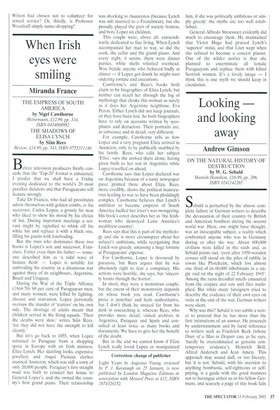When Irish eyes were smiling
Miranda France
THE EMPRESS OF SOUTH AMERICA by Nigel Cawthorne
Heinemann, 112.99, pp. 314, ISBN 0434008982
THE SHADOWS OF ELISA LYNCH by Sian Rees
Review. £14.99, pp. 343, ISBN 0755311140
Before television producers finally concede that the 'Top-20' format is exhausted, I predict that we shall have a Friday evening dedicated to the world's 20 most peculiar dictators and that Paraguayans will feature strongly.
Take Dr Francia, who had all prostitutes adorn themselves with golden combs, or his successor. Carlos Lopez, a grossly fat man who liked to show his mood by his choice of hat. During important meetings a servant might be signalled to whisk off his white hat and replace it with a black one, filling his guests with foreboding.
But the man who dominates these two books is Lopez's son and successor, Francisco. Fatter even than his father — someone described him as 'a tidal wave of human flesh' — Lopez is notable for embroiling his country in a disastrous war against three of its neighbours. Argentina, Brazil and Uruguay.
During the War of the Triple Alliance (1864-70) 80 per cent of Paraguayan men, and many women, were killed by fighting, disease and starvation. Lopez personally oversaw the murder of 'traitors' on his own side. The shortage of adults meant that children served in the firing squads. 'Then the deaths were slow,' writes Sian Rees, 'for they did not have the strength to kill cleanly.'
But let's go back to 1855, when Lopez returned to Paraguay from a shopping spree in Europe with an Irish mistress, Eliza Lynch. Her dazzling looks, expensive jewellery and risque Parisian clothes stunned Asuncion, which was still a town of only 20,000 people. Paraguay's first straight road was built to connect her house to General Lopez's, and she owned the country's first grand piano. Their relationship was shocking to Asuncenos (because Lynch was still married to a Frenchman), but she proudly played the part of society hostess, and bore Lopez six children.
This couple were, above all, extraordinarily dedicated to fine living. When Lynch accompanied her man to war, so did the cook, the cellar and the grand piano. And every night, it seems, there were dinner parties, while shells whistled overhead. Woe betide anyone who behaved badly at dinner — if Lopez got drunk he might start ordering torture and executions.
Cawthorne's and Rees's hooks both claim to be biographies of Eliza Lynch, but neither can reach her through the fog of mythology that cloaks this woman as surely as it does her Argentine neighbour, Eva Peron. Either Lynch did not keep journals, or they have been lost. So both biographers have to rely on accounts written by sycophants and detractors. Their portraits are, in substance and in detail, very different.
For example, Cawthorne tells us how Lopez and a very pregnant Eliza arrived in Asuncion, only to be publically snubbed by his family, Rees, who calls her subject `Elisaf, says she arrived there alone, having given birth to her son in Argentina while Lopez travelled on ahead.
Cawthorne says that Lopez declared war on Argentina because of a nasty newspaper piece printed there about Eliza. Rees, more credibly, shows the political manoeuvres leading to war to have been ploddingly complex. Cawthorne believes that Lynch's ambition to become empress of South America fuelled her lover's war-mongering. His book's cover describes her as 'the Irishwoman who destroyed Latin America's wealthiest country'.
Rees says that this is part of the mythology and she is more circumspect about her subject's ambitions, while recognising that Lynch was greedy, amassing a huge fortune at Paraguayans' expense.
For Cawthorne, Lopez is devoured by paranoia, but Rees argues that he was absolutely right to fear a conspiracy. His actions were horrific, she says, but 'sincerity looms through the horror'.
In short, they were a monstrous couple, but the extent of their monstrosity depends on whose book you read. Cawthorne's prose is punchier and feels authoritative, but I don't think he strayed far from his desk in researching it. whereas Rees, who provides more detail, visited archives in Argentina, Paraguay and Spain and consulted at least twice as many books and documents. We have to give her the benefit of the doubt.
But in the end we cannot know if Eliza Lynch really loved Lopez or manipulated Correction: change of publisher Light Years by Augustus Young, reviewed by P. J. Kavanagh on 25 January, is now published by London Magazine Editions in association with Menard Press at £15, ISBN 1874320152. him, if she was politically ambitious or simply greedy: the myths are too well established.
General Alfredo Stroessner evidently did much to encourage them. He maintained that Victor Hugo had praised Lynch's 'superior' mind, and that Liszt wept when she refused to become a concert pianist. One of the wilder stories is that she planned to exterminate all female Paraguayans and replace them with kilted Scottish women. It's a lovely image — I think this is one myth we should keep in circulation.


































































 Previous page
Previous page